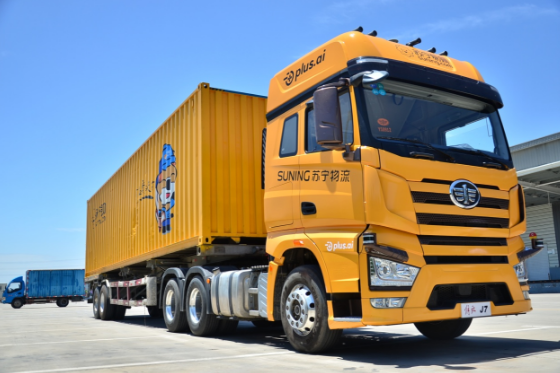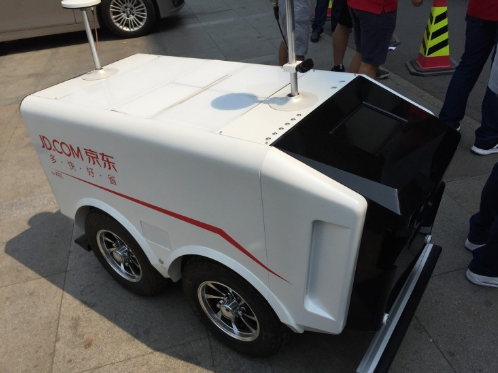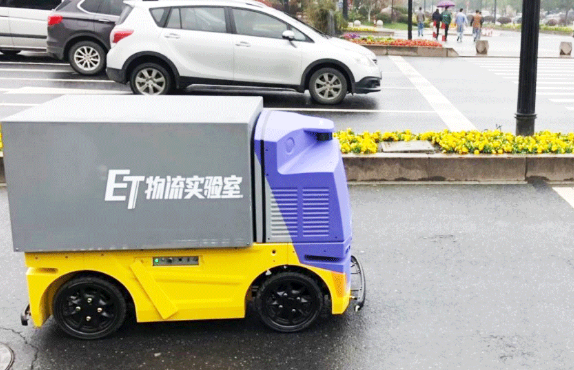Chinese e-commerce operators get involved in unmanned logistics vehicles
In recent days, the news about Chinese e-commerce operators launching unmanned logistics vehicles or testing them on roads have sprung up frequently. It is said that the self-driving technology may probably be used in commercial scenarios first, especially in logistics, such as goods delivery, port transshipment and industrial park transportation, etc.
E-commerce companies seem to be preponderant over other industries in logistics area. Using autonomous driving technologies in goods delivery or other logistic businesses will not only enhance the transport efficiency, but also save the cost in human resources. Besides, for most companies, involving in such a cutting-edge technological area will help them to establish a progressive social image. As to the safety issue which concerns the public most, employing autonomous driving system in logistics field is more acceptable than in private cars.
Suning.com
On May 24, wuliu.suning.com tested its unmanned truck on roads in Fengxian District, Shanghai. Reportedly, the tested truck, with L4 self-driving functions, is jointly developed by Suning.com's logistics platform and China's AI startup PlusAI. A few days ago, the company has finished the road test of its unmanned heavy trucks in some high-speed scenarios.

Reportedly, the unmanned truck, weighing around 40 tons, can not only automatically plan routes, but also can accurately identify and avoid the obstacles as far as 300 meters away. If someone pops up on the road, the unmanned driving system can detect instantly, deliver a warning instruction and let the vehicle stop before the collision happens.
From the photos exposed, Suning.com's unmanned truck was a facelift model from the truck maker FAW Jiefang, a wholly-owned subsidiary of FAW Group. In October last year, the truck manufacturing company completed the China's first L3 intelligent vehicle road test on highways and then obtained the license for commercial vehicles in April to test its ICVs (intelligent-connected vehicles) on roads in this country.
JD.com
JD.com, a Chinese e-commerce company and one of the two largest B2C online retailers in China, debuted its self-developed L4 unmanned heavy truck at 618 JD CUBE on May 29, which is expected to begin commercial trial-operation by 2020.

The L4 unmanned heavy truck, as one of the latest achievements developed by JD.com's Silicon Valley R&D Center, has completed 2,400 hours of super intelligent driving testing on some authorized roads in the U.S.
In the future, JD.com will establish the logistics network in China based on the L4 unmanned heavy truck, so that these trucks can run on highways in Beijing, Shanghai, Guangzhou and seven regional centers of JD.com, but will not enter into the urban cities, said Xiao Jun, vice president of JD.com and president of X-business.
The group will accordingly build several service zones for these trucks at the roadside of the highways. Before entering into urban areas, the unmanned trucks will stop at the service zone first, and then drivers who stay at service zones will drive these trucks into JD.com's logistic centers, which are generally less than 10 kilometers away from highways, Xiao Jun added.
Alibaba
Alibaba Group's Cainiao Network and RoboSense, jointly launched G Plus, the world's first solid-state LiDAR-equipped unmanned logistics vehicle at the 2018 Global Smart Logistics Summit (GSLS) on May 31. This is the first time that solid-state LiDAR has been applied in unmanned vehicles.

The G plus carries three units of RS-LiDAR-M1Pre, developed by RoboSense, the Chinese leading environmental perception solutions provider of autonomous driving LiDAR, to ensure powerful 3D perception for driving. This enables the driving system to identify and clearly “see” the shape, distance, azimuth, driving speed and direction of such obstacles as pedestrians, cars, trucks on its running way. Meanwhile, solid-state LiDAR allows a vehicle to know the right areas for driving, thus ensuring smooth vehicle current in complicated traffic environment.
At the GSLS, Cainiao Network announced the unmanned logistics plan, dubbed “Hump” (Tuofeng, in Chinese), to promote the mass production of unmanned vehicles with partners such as RoboSense, FAW Jiefang, Beihang University, etc.
On April 19, the company released a piece of video that recorded the road test of its self-developed unmanned van. According to local media reports, the company said autonomous driving technologies in logistics have ripened, and they plan to start putting their commercial mass-produce unmanned delivery vans on roads by this year.
- Tireworld Insight: Domestic tire makers eye overseas expansion
- Tireworld Insight: Price disparity severe between China's rubber exports and imports
- Tireworld Insight: China tire exports dependent on US market performance
- Tireworld Insight: SHFE rubber expected to move in tight range in short-term
- Tireworld Insight: Rubber futures to test near-term resistance at 15,000 yuan/tonne
- Tireworld Insight: China’s tire industry on track of rapid growth






